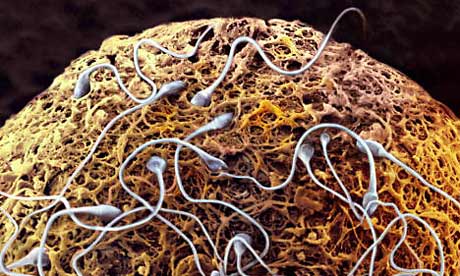Scientists have grown sperm in the laboratory in a landmark study that could help preserve the fertility of cancer patients and shed fresh light on male reproductive problems.
Fertility experts called the work a "crucial experimental advance" towards the use of lab-grown sperm in the clinic and a stepping stone to the routine creation of human sperm for men who cannot make the cells normally.
Though the procedure would be illegal in Britain under current legislation, sperm grown in the laboratory, if proven safe, could be used to help infertile men have children through standard IVF treatments.
The procedure could also benefit boys with cancer who are too young to produce sperm but are at risk of being made infertile by radio- or chemotherapy.
While men can have their sperm frozen before cancer treatment, the latest research suggests boys could have testicular tissue removed and kept in cold storage for use in later life.
Japanese researchers cultivated small pieces of tissue from the testes of baby mice on a gel bathed in nutrients. After several weeks they collected viable sperm from the tissue.
The sperm appeared to be completely healthy and were used in IVF treatments to produce 12 live mouse pups that went on to have young of their own. Seven of the mice were born after sperm heads were transferred into 23 eggs using a technique called round spermatid injection, and another five were born after 35 eggs were fertilised using intracytoplasmic sperm injection (Icsi), a common IVF procedure.
Importantly, the scientists retrieved healthy sperm from tissue that was cultivated after being frozen for up to 25 days, suggesting that cold storage did not harm the cells. The work, reported in the journal, Nature, is the most successful attempt yet to grow mammalian sperm from testicular tissue in the laboratory.
"One of the problems I face, as a urologist, is that we do not have any effective ways to treat patients suffering from male infertility due to defective or insufficient sperm production," said Takehiko Ogawa, who led the study at Yokohama City University Graduate School of Medicine. "Most of these problems are for unknown reasons."
Using the technique, he said, scientists will be able to study the process of sperm production in detail and help elucidate the glitches that cause infertility.
In an accompanying article, Marco Seandel and Shahin Rafii at the Weil Cornell Medical College in New York said the work was "a crucial experimental advance along the thorny path to the clinical use of sperm" grown in the lab. They warn, however, that the fertility of mouse pups born from the lab-grown sperm was a "crude indicator" of their health, and that subtle genetic changes in the sperm "could be pivotal for the wellbeing of subsequent generations".
Allan Pacey, a senior lecturer in andrology at Sheffield University, said: "It is not totally clear how sperm are formed and why in some men it doesn't work properly. This could help discover new drugs or treatments to stimulate infertile men to produce more or better sperm. It also may help preserve the fertility of some males."
The study, he said, was "a small but important step in understanding how sperm are formed which may, in time, lead to us being able to routinely grow human sperm in the laboratory."
"It is clearly important to make sure that any sperm produced are safe and give rise to healthy offspring when used, and that they in turn have healthy offspring. We need to be cautious with this kind of work," he added.









